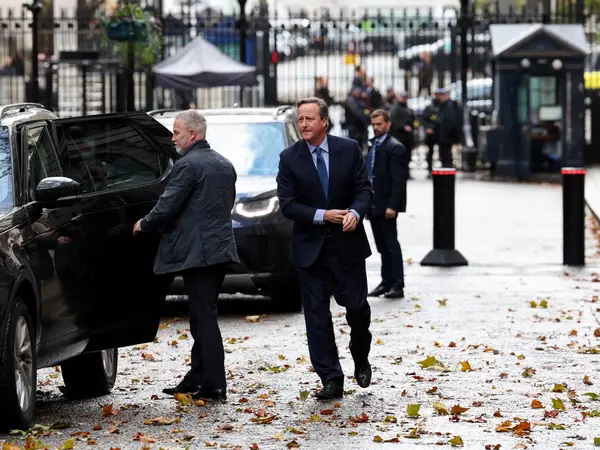In a shock cabinet reshuffle, former PM David Cameron has been brought back into politics as the Conservative party’s foreign secretary.
It came following the firing of home secretary Suella Braverman, as she was the most outspoken member of government to critizing the police for its handling of pro-Hamas protests in the UK’s streets.
The protests, partly supported by Iran, had brought hundreds of thousands of people to the UK’s streets, including across the British capital, leading to a wave of antisemitism and Islamist manifestations in Britain.
In a shock move, she has been replaced by foreign minister James Cleverly, with the role of foreign minister going to former PM David Cameron, who stepped down after the Brexit referendum in which the UK voted to leave the European Union.
It was Cameron who during his time as the British PM between 2010-2016, reinstated relations with Iran. He met with President Hassan Rouhani at the UN headquarters in New York in 2014 in the first such meeting since the Iranian Revolution in 1979.
He was charged with reopening diplomatic ties which had been cut after Iranian regime loyalists stormed the British embassy in Tehran in 2011.
In 2013, the election of what appeared to be a more moderate Rouhani, replacing Mahmoud Ahmadinejad, paved the way for a thaw in ties. In 2014, the UK reopened its embassy.
The 2014 meeting focused on nuclear talks but also addressed the rising threat of the Islamic State group, which at the time had taken over much of Syria and Iraq.
A statement from the PM’s office at the time offered signs of progress, and said: “The PM and president acknowledged that there had been significant differences between their countries in the past, and agreed that we should seek to progressively improve our bilateral relationship.”
But almost a decade later, little has changed with Iran remaining one of the world’s largest funders of terror. The PM office at the time had stated: “The prime minister and president noted the threat posed to the whole region by ISIS, and agreed that all states in the region must do more to cut off support for all terrorist groups, including financial support.”
Since then, in addition to being a state sponsor of terror, Iran has been declared by the UK as one of its biggest domestic threats with numerous foiled attacks on British soil in the last year. This includes MI5 admitting it could no longer secure the offices of Iran International which had come under threats from Iranian state agents, forcing a temporary relocation to Washington.
Cameron has been out of politics for several years, penning his memoirs and delving into business, including Greensill Capital, a finance firm which later collapsed.
In 2015, Cameron felt the wrath of interfering in US politics when he attempted to lobby senators against a new bill imposing fresh sanctions on the Iranian regime. At the time, one Republican told The Telegraph that the prime minister’s intervention into American politics was “not a productive move”.
The prime minister had warned that even the threat of fresh sanctions could lead to the breakdown of the delicate nuclear negotiations going on in Geneva between Iran and a six-nation bloc that included Britain and the US.
In contrast, just weeks later, Israeli prime minister Benjamin Netanyahu was welcomed by Republicans when he came to Washington backing the US to be more hawkish on Iran policy.
Cameron’s previous attempts to adopt a lenient approach toward Iran were consistent with the policies of then-US President Barack Obama. The Biden administration is now pursuing a similar course of action, but it is encountering criticism in the process.
In 2015, Mark Dubowitz, the head of the Foundation for the Defence of Democracies, a think tank that supports deadline-triggered sanctions against Iran, said Mr Cameron’s intervention did not appear to have changed the argument on Capitol Hill. “Senators don’t seem to be persuaded by David Cameron, who they perceive to be even further to the Left than the Obama administration on Iran,” he told The Telegraph.
A recent investigation in The Times found around a dozen regime-backed organizations working on British soil, showing a deep infiltration into UK society through the likes of religious, charitable and educational institutions.
Just weeks ago, now Home Secretary James Cleverly was butting heads with his predecessor Suella Braverman over the contentious issue of designating the IRGC, like its ally, the US, which designated the group in 2019.
Speaking to the Jewish Chronicle in September, Cleverly said that “many of the things that people want” from proscription were “actually being achieved by our sanctions regime” that is already in place.
He added: “We will always keep our options open and we will always act in our country’s best interests.”
In September, Cleverly insisted that “any decision we make on proscription or sanctions is always done with the protection of British nationals and British interests at heart”.
Meanwhile, at least eight IRGC commanders have recently been offered the podium to give talks at British universities, pumping Islamic Republic rhetoric into the minds of young students.






















